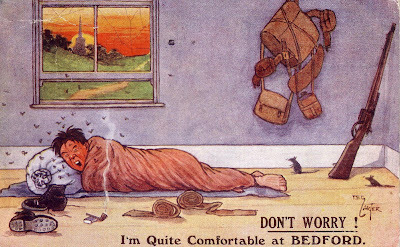Scots/Russians in 1914 Britain
Posted by Groomporter on Jan 7th 2018
Scots/Russians in 1914 Britain
There's a curious bit of urban legend that in September and August of 1914 thousands of Russian troops had been shipped to the UK in order to reinforce the British Army on the western front early in World War I. They were commonly said to have been seen boarding, or traveling on trains. Although there is also a story that someone in the countryside claimed to have sighted 150,000(!) Cossacks riding across his estate. Their lack of English, or heavy accents and foreign ways were how they were supposedly recognized. The rumors were apparently so strong that reports of them were appearing in newspapers at the time:
“an immense force of Russian soldiers – little short of a million it is said – have passed, or are still passing, through England on their way to France”.
One witness claimed to see 10,000 Russians march along the Embankment towards London Bridge station, while a rail porter at Durham reported finding an automatic chocolate machine jammed by a ruble coin. One explanation was that Gaelic-speaking Scots troops were the origin of the rumors. This started the rumor that a force of Russians had landed in the north of Scotland, and were on their way south. The fantastic story, which spread like wildfire, had some foundation, for it fitted in remarkably well with the movements of the Highland Brigade.
More than a dozen troop trains had passed through Newcastle and York, traveling in succession during the hours of darkness. Many of the men on board were reported to speak a foreign language, wear curious headgear, and be uncommunicative and shy in manner. When asked from whence they came by benevolent ladies staffing a canteen on York platform, they could only murmur, ‘Roscha’ (Ross-shire).
And it is certainly true that from August 1914 to May 1915 between 16,000 and 20,000 members of the Highland Division (later to become the 51st Highland Division) were transferred to Bedford, England. This included their infantry battalions, cavalry, artillery, medical and support units. Their duties early in the war were intended for the home defense of Britain in the event of an invasion. Bedford was judged as a good central location from which they could quickly move to reinforce defense units on the east or southern coasts.

"A large number of the soldiers, particularly those of the Cameron Highlanders, spoke Gaelic as their first language. It is probably not too surprising that the Highlanders were perceived as being somewhat wild and uncouth by some of the more genteel members of local society."
"-The Bedford Highlanders"
The website linked to above says that for a number of the soldiers it was the first time they had stayed in houses with hot and cold running water and gas. There's a story of a soldier supposedly washing a pair of socks in a small water closet. He called out to a roommate asking how to get more water, his buddy replied to pull the chain and when he did he watched in horror as his socks flushed out of sight...
So the idea of Highland Scots unfamiliar with English ways, some of whom were native Gaelic speakers, or spoke with thick brogues, would seem to be a reasonable explanation for the rumors of Russian troops. And the rumors were probably reinforced by Russian officers and their servants who arrived in England to negotiate for supplies and serve as military liaisons. But these seems to be another explanation. It appears to have been jumped on and used as a disinformation campaign by British intelligence by letting the rumor grow and probably giving it the occasional nudge of encouragement.
According to David Clarke, an academic from Sheffield Hallam University:
“It was an accidental rumour, which turned into a massive delusion. The authorities just let it run, and it was seem to have played a role in the war.”
On September 7, news reports from the Continent disclosed how the Kaiser and his senior headquarters staff had left France due to “the official news of the concentration of 250,000 Russian troops in France”. It may even have helped the allies at the Battle of the Marne. The Germans reportedly detached two divisions to repel a Russian assault on the Belgian coast, weakening their force for their fight at "Miracle of the Marne".
